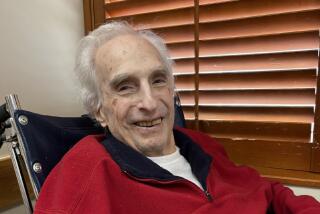MOGULS : The High and the Mighty
Screenwriter Ben Hecht once described the typical studio mogul as “a man who has no taste to be violated or distorted.” This con cept--personified by the popular image of a cigar-chewing wheeler-dealer--has served as a blanket excuse for the periodic excesses of the film industry. But other stereotypes are more accurate.
Many of the early moguls--Carl Laemmle Sr. (Universal), Samuel Goldwyn Sr. (Goldwyn), Adolph Zukor (Paramount), William Fox (Fox Film Corp.) and Louis B. Mayer (MGM)--were immigrants. Though none knew anything about making movies at first, all had an intense desire to succeed. “For more than 30 years,” Fox said before his death in 1952, “I avoided carrying a watch. My day ended when the work was done.”
What they lacked in creativity they made up for in promotional and organizational skills. Most had sharp eyes for talent and charisma, and by the 1930s they had turned their studios into enormous assembly lines for hits. (Carl Laemmle Sr. also turned Universal into a sort of family operation, putting more than 75 relatives on the payroll and prompting Ogden Nash to write: “Uncle Carl Laemmle, Has a very large faemmle.”)
Hollywood’s power was concentrated in the hands of eight major studio heads, who determined which films would be produced at what cost, who would star and where the films would be shown. Their absolute power prompted Life magazine to complain that they were too often “unlettered vulgarians or formula-bound entrepreneurs.” Producer Hal Wallis bolstered the image with his oft-repeated account of sending Jack Warner a copy of the lengthy best-seller “Anthony Adverse” for consideration as a film. It was returned with the note: “Read it? Hell, I can’t even lift it.”
In reality, most story decisions were delegated to production chiefs such as Irving Thalberg, David O. Selznick and Darryl F. Zanuck, who became the “boy geniuses” of the 1930s. They rose through the ranks and wound up heading the studios themselves. They, too, sublimated almost every aspect of their lives to their profession. Thalberg, MGM’s production chief, is said to have held a story conference while he was attending an actor’s funeral because he simply could find no other time for it.
More to Read
Only good movies
Get the Indie Focus newsletter, Mark Olsen's weekly guide to the world of cinema.
You may occasionally receive promotional content from the Los Angeles Times.










